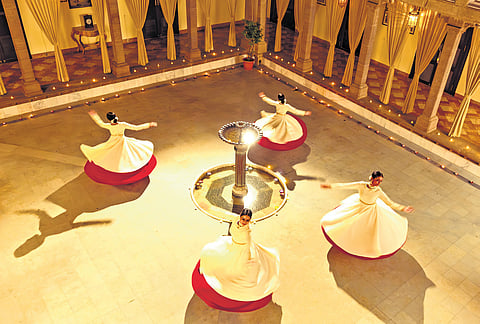

In the fast-paced world of today, humans are making nearly thousands of decisions in a single day, leaving little room for rest. As finding moments of peace and happiness has become like chasing shadows, some are turning to the wisdom of Sufism to reconnect with themselves. For PR professional Shreya Pathak, her Spotify playlist of Sufi songs is a way to switch off from the world.
“On days when my mind feels blocked, unable to think about what’s next, I turn to my favourite songs like ‘Arziyan’ from the film Delhi-6 or the soulful melodies of A.R. Rahman and Kailash Kher. I’ve named my playlist Inner Peace because, in the end, the peace within is what truly reflects outward.” Account director Shivangi Malhotra, listens to ‘Khwaja Mere Khwaja’ or ‘Kun Faya Kun’ to feel that “immediate” sense of calm in unnerving situations.
Giving Delhiites a chance to be touched by the magic of Sufi, the three-day festival Jahan-e-Khusrau makes a grand return to the city for its 25th edition. Curated by renowned filmmaker, painter and cultural figure, Muzaffar Ali, it brings dervishes, qawwali, Bhakti renditions, and Sufi dance and music.
The highlight is its theme of Vasudhaiva Kutumbakam — imagining the world as one where Sufi music, poetry, art, dance and heritage will merge to become one soul-stirring act through interesting crossovers between artists from Delhi, Kashmir, Ludhiana, Lucknow, Punjab, Mumbai, Rajasthan and Kutch, along with a bustling crafts bazaar and culinary table. “This silver jubilee edition is an invitation to rediscover the timeless wisdom of Sufi traditions and to celebrate the harmony that binds us all,” Ali says.
Oneness in art
In the opening act, award-winning Ahmedabad-based Kathak dancer Sanjukta Sinha will perform graceful dance and Abhinaya (acting) choreographed in the voice of 11th-generation Sufi-folk singer Mooralala Marwada from Kutch.
“Since the theme celebrates oneness, I feel that dance and music should become one entity on stage. Marwada’s raw voice will beautifully weave through the Kathak performance.
We will portray life in rural Kutch through the use of the region’s shawls, mirror-work umbrellas and puppets. I will also do a solo Abhinaya act where I will be talking to a puppet to narrate a story. The ending will be a performance on ‘Dama Dam Mast Kalandar’ song that usually sets the stage on fire,” says Sinha.
‘Sufism destroys your ego’
Another act to look forward to is Kashmir’s sufi-rock singer Yawar Abdal’s collaboration with Rajasthan’s composer Jasu Khan Manganiyar Abdal’s sentimental tracks ‘Soz-e-dil’, ‘Tamanna’ plus an enthralling jugalbandi with Khan on the evergreen ‘Lal Meri Pat.’ “While we belong to different cultures, we are all the same on a humanitarian level.
Such performances bring the striking contrasts of God’s creation and the sublime harmony of man-made artistry,” says Abdal whose ambient progressive-rock music is influenced by Persian poets Rumi, Hafiz Shirazi, and Saadi Shirazi as well as Urdu poets Allama Iqbal, and Ahmed Faraz.
“For me, Sufi is not a lifestyle or religion. It’s a path to a final destination that during the journey gives answers to who we are, where we have come from, and where we are headed. It is beyond this materialistic world and tangible body like the garden that Rumi mentions: ‘Somewhere beyond right and wrong, there is a field and I will meet you there.’ It destroys your ego to help you achieve a state of higher being,” he says.
Mooralala will be performing his popular Sufi songs ‘Jogi Jogiyan Ta Sang’, ‘Banjara - Maatibaani’, ‘Main Wari Jaun’, and ‘Chhod Ke Mat Jao’ inspired by the teachings of Mirabai and Kabir. For him,
Sufism is about the “inner cleansing” of the soul that often gets clouded with worldly concerns. “Sufism detaches you from the ego and guides you to surrender to love, devotion and self-contentment.”
Beauty of hand-work
For curator Ali, creating beauty with hands is also an “essential attribute” of the Sufi message of love. The festival’s TEH Bazaar will present handcrafted textiles, and decorative arts and crafts. From Lucknow’s Chikankari, Pochampally’s Ikat, and Muga silk of Assam to Paper Mache art of Kashmir, there’s lots in store.
“Over the years from my journey in Kashmir, I found that all the crafts there have been blessed by the Sufis. Also, in places like Kutch, there are mythical tales of travellers being taught Tana Bana weaving. Craft goes beyond textiles, extending to cuisine, making instruments etc…and any hand-work involves compassion and the liberation of the mind,” Ali says.
Visitors can also expect book discussions and film screenings on the intersection of literature and philosophy. Architect, author and cultural entrepreneur Meera Ali who has shaped the artistic vision of the festival says, “In a world that often feels divided, the festival stands as a testament to the power of art in bringing people together. This year, we celebrate a movement that continues to inspire and heal through music, poetry, and collective experience.”
Jahan-e-Khusrau is on at Sunder Nursery, Nizamuddin, February 28 – March 2, 11 am onwards